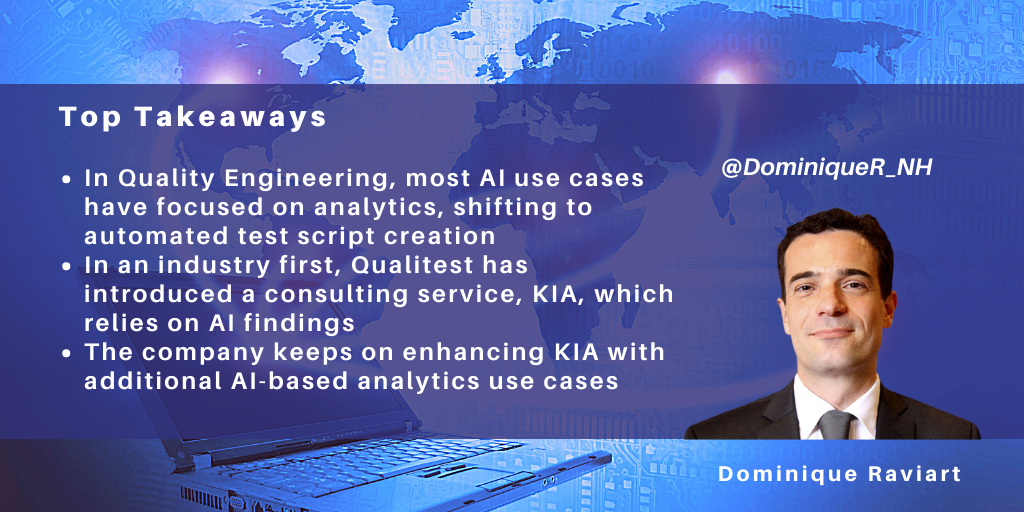Search posts by keywords:
Filter posts by author:
Related NEAT Reports
Other blog posts
posted on Jul 28, 2020 by Dominique Raviart

QA pure-play Qualitest recently briefed NelsonHall on a new AI-based offering the company launched in 2019.
The testing services industry began to deploy AI-based offerings about three years ago, starting with AI-based analytics use cases, looking at where and what to test better. Since then, the focus has shifted to AI-based automation, looking initially at the automated creation and maintenance of test scripts.
New to the table is the use of AI in consulting offerings. Qualitest is one of the early vendors to do this with its Knowledge and Innovation Assessment (KIA) offering. The company has bold ambitions and wants to create the new TMAP or TMMi (test process assessment and improvement methodologies), ones that will be based on data and automated, rather than purely relying on expertise.
Assessing Automation Efforts
The primary emphasis of KIA is bringing an automated approach to quality assessments. It relies on AI-based analytics use cases that exist in the market already, with Qualitest adding further use cases.
KIA’s approach relies on the collection and analysis of data from different sources; for example, project and defect management tools (e.g. Micro Focus ALM, and JIRA), ITSM tools (e.g. ServiceNow), and agile development tools (GitHub).
Qualitest highlights that this step requires mature clients, ones that have implemented tools and use them, and that can provide excellent data quality in abundance.
Once Qualitest has the required data, the next step is analytics, taking a two-step approach. It will identify KPIs such as:
- Test coverage, i.e. requirements not covered by tests
- Tests not attached to requirements
- Defects not covered by test scripts.
The KPIs help to provide a high-level view of the client’s automation effort. Qualitest will then build a roadmap of where the client should deploy test automation, around several items; for example, governance and reporting, automation, NFT, knowledge management, defect management, and test environment and data. It will take a quick-win approach to its roadmap, and bring incremental improvements, focusing on 30-, 60-, and 90-day milestones.
Along with this automation assessment, Qualitest will proceed to automated root cause analysis of defects, logs, and incidents using ML technology. The company will categorize data in categories such as code, configuration, data, and security. The approach helps to identify where the priorities are. And Qualitest complements the root cause analysis by benchmarking it.
AI is Reshaping the QA Industry
The QA industry has become one where scale dominates, with large vendors that have significant R&D budgets being able to invest in new IP and accelerators. The deployment of AI use cases in QA is rapidly expanding and is reshaping the industry. We have seen smaller QA vendors taking a focused approach on AI, competing, sometimes effectively, with vendors with deeper pockets. Qualitest is one of these vendors reshaping the industry. Last year, the company acquired Algotrace, an AI technology firm, and it is rapidly changing its portfolio around AI, also continuous testing and specialized services. This is excellent news: the QA industry continues to reinvent itself at high speed.

Aug 06, 2020, by ARUL SUNDARAM